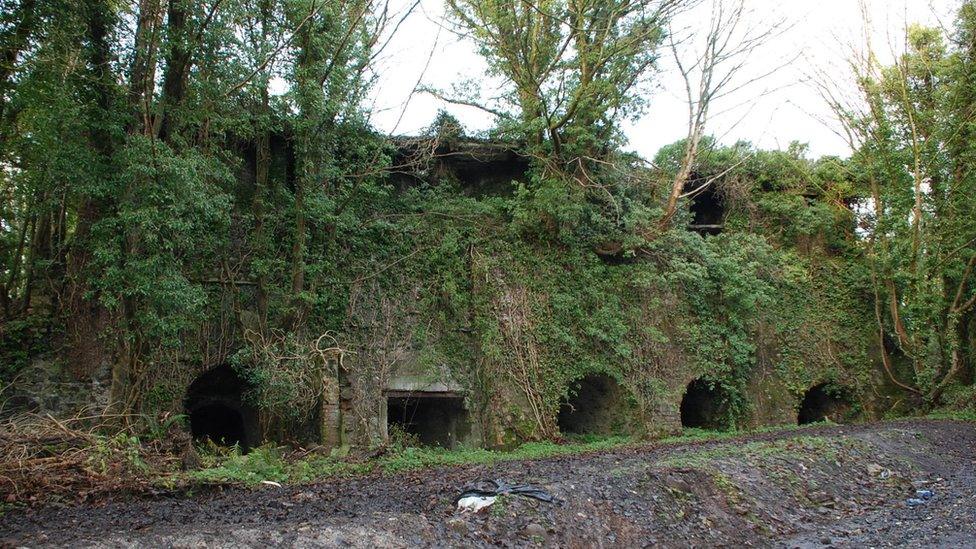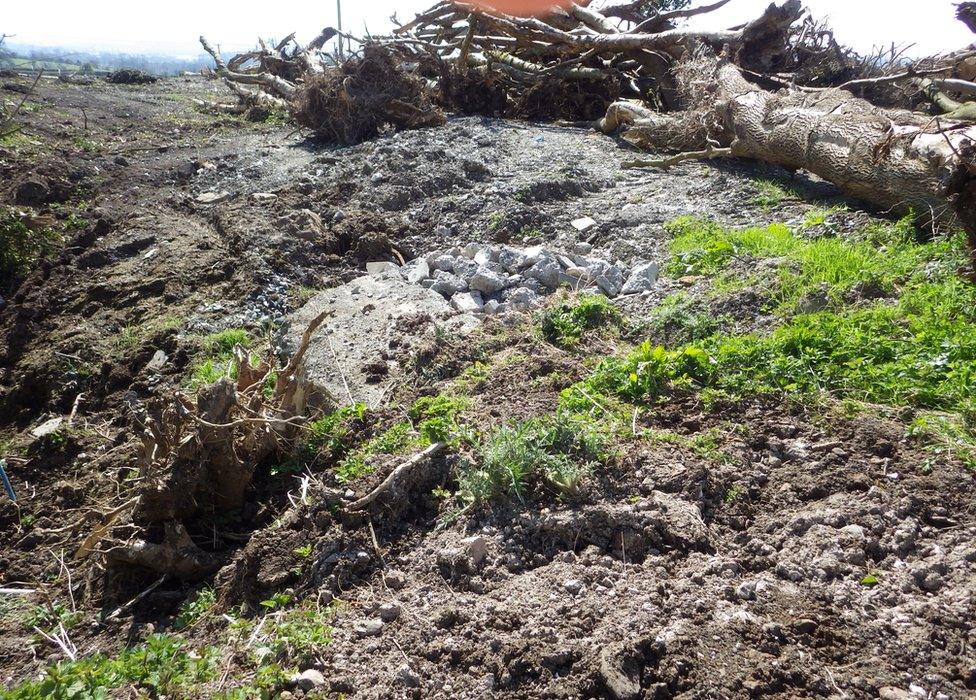Monuments in Northern Ireland: Man fined £50k for demolishing kilns
- Published

The Moneybroom lime kilns, as seen before they were demolished in April 2021
A building contractor has been fined £50,000 for demolishing a protected historic monument on a site he intended to develop in County Antrim.
Henry James Price, from Glenavy Road, Lisburn, recently pleaded guilty to destroying a set of 19th Century lime kilns on land he owned in Moneybroom.
The judge said it was the first prosecution of its kind in Northern Ireland.
Fining Price, he said saying there must be a deterrent to dissuade others.
The judge at Craigavon Crown Court added that the defendant's culpability was high given he knew the kilns were protected yet he still chose to cause "irreparable damage" to them.
During the case, the court was told that 64-year-old Price is both a farmer and a director of a successful house building firm, JH Price and Sons Ltd.
He bought the site on Moneybroom Road for £270,000 in June 2019. It is close to his home and he was already in possession of some adjoining land.
In August 2020, Price lodged an application with the council to secure the site and potentially develop a small portion of it, but the project was hit by delays.
'Industrial architecture'
His site contained a large, protected structure known as the Moneybroom lime kilns.
There were a number of limestone quarries in the Lisburn area and during the Victorian era kilns were built to produce lime for the agriculture and construction industries.
The court heard that a chartered architect estimated it would have cost about £630,000 to restore the kilns to their original condition.
Because they were protected monuments, a grant of up to £50,000 would have been available towards the restoration, but that still left Price facing a substantial bill.
On 16 April 2021, police were called to the site following a report of building works taking place where protected monuments were situated.
Officers discovered the kilns had been demolished and when they interviewed Price in September that year, he admitted he had ordered his employees to clear them.
He apologised for destroying the kilns at that time, but told police he believed they were "structurally dangerous".
Price also claimed to police there had been significant antisocial behaviour at the site, particularly at night and "he was afraid of someone getting killed".
'Would have fallen apart'
The Moneybroom kilns were most likely constructed between 1870 and 1900, according to an estimate by the Historic Environment Division (HED), an agency within Stormont's Department of Communities.
The judge said these were the only kilns of their type in Northern Ireland and were "an almost unique example of this type of industrial architecture".
In a mitigation plea, a defence barrister said Price "accepts without reservation that he made a grave error and that the demolition of the lime kilns should never have taken place".
But he added that "the integrity of the kilns was not jealously guarded by the department over the years", pointing out there had been a lack of investment and no departmental plan to restore them.
The barrister said his client had spent about £50,000 to secure the site and replant trees.
He added Price had also lost his single farm payment and "by virtue of his conduct it is now simply not possible for the defendant to develop the site in any way that would generate any profit - he has closed that particular avenue off for good".

The site was cleared in April 2021 on Price's instructions
The judge acknowledged that the kilns were not visible from the road, were not a money-generating tourist attraction and that their value was subjective.
He also conceded that with no plan to repair them, they would eventually have fallen apart by themselves.
Nevertheless, he said there had to be a deterrent to dissuade others who "may be tempted to play fast and loose" with legislation protecting other historic monuments.
'Irreplaceable' heritage
Giving Price credit for his guilty pleas and clear record, the judge told the defendant that if had he not admitted the offence, the fine would have been £75,000.
Price was allowed six months to pay.
In a statement, Brian McKervey, acting director of the Historic Environment Division (HED), said: "We welcome the court's recognition that our heritage is an important and finite resource and an appreciation that once gone, these sites are impossible to replace.
"Not only did Moneybroom lime kilns, which date back to the 1800s, provide a unique example of a time when our society was undergoing massive change, they were a reminder of many aspects of our shared heritage, including the industrialisation of our landscape and society."
He added: "HED appreciates the pressures that scheduled monument owners can face and one of our primary aims is to support them and facilitate their needs, where possible."
But he said the department will "work with criminal justice partners to pursue prosecutions where warranted, in particular when historic monuments have been damaged or destroyed".